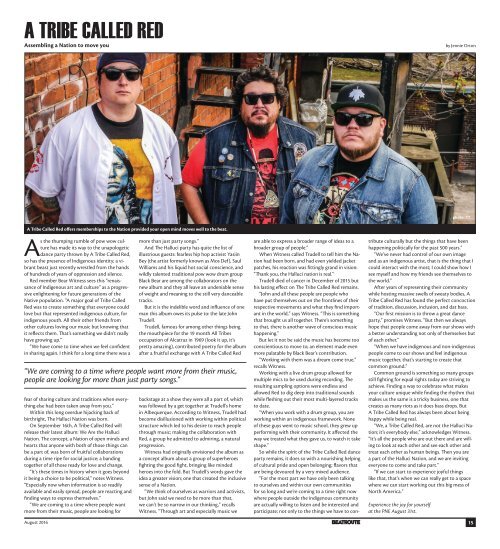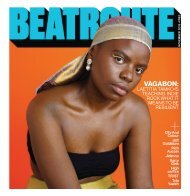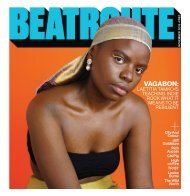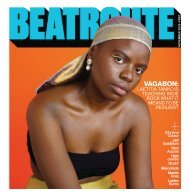BeatRoute Magazine B.C. print e-edition - August 2016
BeatRoute Magazine is a monthly arts and entertainment paper with a predominant focus on music – local, independent or otherwise. The paper started in June 2004 and continues to provide a healthy dose of perversity while exercising rock ‘n’ roll ethics.
BeatRoute Magazine is a monthly arts and entertainment paper with a predominant focus on music – local, independent or otherwise. The paper started in June 2004 and continues to provide a healthy dose of perversity while exercising rock ‘n’ roll ethics.
Create successful ePaper yourself
Turn your PDF publications into a flip-book with our unique Google optimized e-Paper software.
A TRIBE CALLED RED<br />
Assembling a Nation to move you<br />
by Jennie Orton<br />
photo: ???<br />
A Tribe Called Red offers memberships to the Nation provided your open mind moves well to the beat.<br />
As the thumping rumble of pow wow culture<br />
has made its way to the unapologetic<br />
dance party thrown by A Tribe Called Red,<br />
so has the presence of Indigenous identity; a vibrant<br />
beast just recently wrestled from the hands<br />
of hundreds of years of oppression and silence.<br />
Red member Bear Witness sees this “renaissance<br />
of Indigenous art and culture” as a progressive<br />
enlightening for future generations of the<br />
Native population. “A major goal of Tribe Called<br />
Red was to create something that everyone could<br />
love but that represented indigenous culture, for<br />
indigenous youth. All their other friends from<br />
other cultures loving our music but knowing that<br />
it reflects them. That’s something we didn’t really<br />
have growing up.”<br />
“We have come to time when we feel confident<br />
in sharing again. I think for a long time there was a<br />
fear of sharing culture and traditions when everything<br />
else had been taken away from you.”<br />
Within this long overdue hijacking back of<br />
birthright, The Halluci Nation was born.<br />
On September 16th, A Tribe Called Red will<br />
release their latest album: We Are the Halluci<br />
Nation. The concept, a Nation of open minds and<br />
hearts that anyone with both of those things can<br />
be a part of, was born of fruitful collaborations<br />
during a time ripe for social justice; a banding<br />
together of all those ready for love and change.<br />
“It’s these times in history when it goes beyond<br />
it being a choice to be political,” notes Witness.<br />
“Especially now when information is so readily<br />
available and easily spread, people are reacting and<br />
finding ways to express themselves.”<br />
“We are coming to a time where people want<br />
more from their music, people are looking for<br />
more than just party songs.”<br />
And The Halluci party has quite the list of<br />
illustrious guests: fearless hip hop activist Yasiin<br />
Bey (the artist formerly known as Mos Def), Saul<br />
Williams and his liquid hot social conscience, and<br />
wildly talented traditional pow wow drum group<br />
Black Bear are among the collaborators on the<br />
new album and they all leave an undeniable sense<br />
of weight and meaning to the still very danceable<br />
tracks.<br />
But it is the indelible word and influence of one<br />
man this album owes its pulse to: the late John<br />
Trudell.<br />
Trudell, famous for among other things being<br />
the mouthpiece for the 19 month All Tribes<br />
occupation of Alcatraz in 1969 (look it up, it’s<br />
pretty amazing), contributed poetry for the album<br />
after a fruitful exchange with A Tribe Called Red<br />
“We are coming to a time where people want more from their music,<br />
people are looking for more than just party songs.”<br />
backstage at a show they were all a part of, which<br />
was followed by a get together at Trudell’s home<br />
in Albequerque. According to Witness, Trudell had<br />
become disillusioned with working within political<br />
structure which led to his desire to reach people<br />
through music; making the collaboration with<br />
Red, a group he admitted to admiring, a natural<br />
progression.<br />
Witness had originally envisioned the album as<br />
a concept album about a group of superheroes<br />
fighting the good fight, bringing like minded<br />
heroes into the fold. But Trudell’s words gave the<br />
idea a greater vision; one that created the inclusive<br />
sense of a Nation.<br />
“We think of ourselves as warriors and activists,<br />
but John said we need to be more than that,<br />
we can’t be so narrow in our thinking,” recalls<br />
Witness. “Through art and especially music we<br />
are able to express a broader range of ideas to a<br />
broader group of people.”<br />
When Witness called Trudell to tell him the Nation<br />
had been born, and had even yielded jacket<br />
patches, his reaction was fittingly grand in vision:<br />
“Thank you, the Halluci nation is real.”<br />
Trudell died of cancer in December of 2015 but<br />
his lasting effect on The Tribe Called Red remains.<br />
“John and all these people are people who<br />
have put themselves out on the frontlines of their<br />
respective movements and what they find important<br />
in the world,” says Witness. “This is something<br />
that brought us all together. There’s something<br />
to that, there is another wave of conscious music<br />
happening.”<br />
But let it not be said the music has become too<br />
conscientious to move to; an element made even<br />
more palatable by Black Bear’s contribution.<br />
“Working with them was a dream come true,”<br />
recalls Witness.<br />
Working with a live drum group allowed for<br />
multiple mics to be used during recording. The<br />
resulting sampling options were endless and<br />
allowed Red to dig deep into traditional sounds<br />
while fleshing out their most multi-layered tracks<br />
to date.<br />
“When you work with a drum group, you are<br />
working within an indigenous framework. None<br />
of these guys went to music school, they grew up<br />
performing with their community. It affected the<br />
way we treated what they gave us, to watch it take<br />
shape.”<br />
So while the spirit of the Tribe Called Red dance<br />
party remains, it does so with a nourishing helping<br />
of cultural pride and open belonging; flavors that<br />
are being devoured by a very mixed audience.<br />
“For the most part we have only been talking<br />
to ourselves and within our own communities<br />
for so long and we’re coming to a time right now<br />
where people outside the indigenous community<br />
are actually willing to listen and be interested and<br />
participate; not only to the things we have to contribute<br />
culturally but the things that have been<br />
happening politically for the past 500 years.”<br />
“We’ve never had control of our own image<br />
and as an indigenous artist, that is the thing that I<br />
could interact with the most; I could show how I<br />
see myself and how my friends see themselves to<br />
the world.”<br />
After years of representing their community<br />
while hosting massive swells of sweaty bodies, A<br />
Tribe Called Red has found the perfect concoction<br />
of tradition, discussion, inclusion, and dat bass.<br />
“Our first mission is to throw a great dance<br />
party,” promises Witness. “But then we always<br />
hope that people come away from our shows with<br />
a better understanding not only of themselves but<br />
of each other.”<br />
“When we have indigenous and non-indigenous<br />
people come to our shows and feel indigenous<br />
music together, that’s starting to create that<br />
common ground.”<br />
Common ground is something so many groups<br />
still fighting for equal rights today are striving to<br />
achieve. Finding a way to celebrate what makes<br />
your culture unique while finding the rhythm that<br />
makes us the same is a tricky business, one that<br />
creates as many riots as it does bass drops. But<br />
A Tribe Called Red has always been about being<br />
happy while being real.<br />
“We, a Tribe Called Red, are not the Halluci Nation;<br />
it’s everybody else,” acknowledges Witness.<br />
“It’s all the people who are out there and are willing<br />
to look at each other and see each other and<br />
treat each other as human beings. Then you are<br />
a part of the Halluci Nation, and we are inviting<br />
everyone to come and take part.”<br />
“If we can start to experience joyful things<br />
like that, that’s when we can really get to a space<br />
where we can start working out this big mess of<br />
North America.”<br />
Experience the joy for yourself<br />
at the PNE <strong>August</strong> 31st.<br />
<strong>August</strong> <strong>2016</strong> 15


















